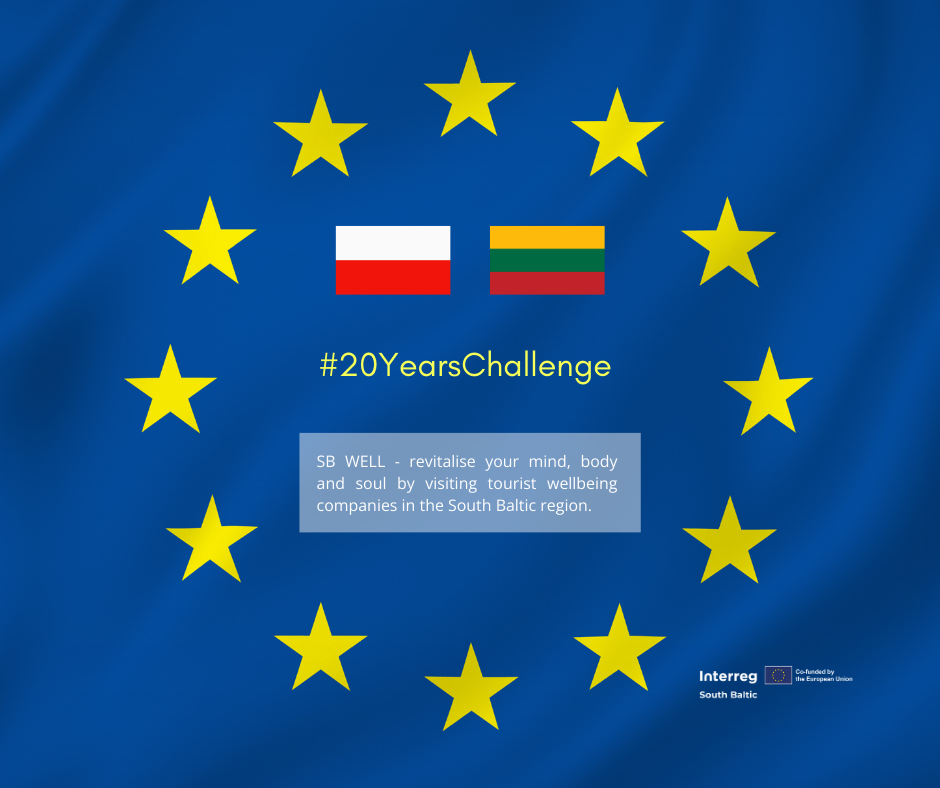The nineth of May marks the celebration of European unity. This year twentieth anniversary of Poland and Lithuania joining the EU allows us to share progress, prosperity, and friendship that continues to strengthen our union.
In the Interreg South Baltic Programme we emphasise the importance of continued collaboration and solidarity, fostering a sense of unity and pride among communities in Poland, Lithuania and beyond.
Let’s continue exploring different perspectives from our projects which Polish and Lithuanian beneficiaries shared with us!
Project #3
SB WELL – Wellbeing Tourism in the South Baltic Region – Guidelines for good practices & promotion: Revitalise your mind, body and soul with by visiting tourist wellbeing companies in the South Baltic region.
Objectives
The SB WELL project aimed to raise public awareness of wellbeing tourism and promote the South Baltic Region as an attractive tourism destination, focusing on wellbeing tourism businesses, potential tourists wishing to experience wellbeing services and stakeholders such as local and regional authorities. The project team focused on the concept promotion, the development of a guide to wellbeing standards and good practices, the identification of pilot places and the development of a ‘Wellbeing Atlas’ – a website, showcasing wellbeing destinations in the region.
Results and good practices
The SB WELL project aimed to raise public awareness of wellbeing tourism and promote the South Baltic Region as an attractive tourism destination, focusing on wellbeing tourism businesses, potential tourists wishing to experience wellbeing services and stakeholders such as local and regional authorities. The project team focused on the concept promotion, the development of a guide to wellbeing standards and good practices, the identification of pilot places and the development of a ‘Wellbeing Atlas’ – a website, showcasing wellbeing destinations in the region.
We asked two SB Well project beneficiaries about their personal impressions, memories and perceptions: prof. Anna Dziadkiewicz (Pomerania Development Agency, Poland) and prof. Ramūnas Povilanskas (EUCC Baltic Office, Lithiania).
The positive impact of EU membership on everyday lives in their region or community
Anna: This May marks 20 years since Poland joined the EU. In my opinion, this is one of the most groundbreaking decisions in the history of my country. EU membership often leads to increased investment in the region, which can stimulate economic growth, create jobs and improve infrastructure. Funds from the EU can be channeled into development projects, including tourism, which strengthen the local economy, and it should be said that the Tricity where I live is a centre not only for business, great investments, but also a well-known tourist destination.
Being part of the EU develops tourism not only through visa-free travel, but also through the opportunity for European entrepreneurs to share good experiences, exchange academic ideas and business opportunities for foreign tourists who expect to be up to date with the latest trends.
EU policies and regulations often push for sustainable practices and development. For regions focusing on wellbeing tourism, EU standards and funding can support projects that protect natural landscapes and promote environmentally friendly tourism.
The impact positively contributes to the development and improvement of wellbeing tourism, making the South Baltic region more attractive to visitors seeking wellbeing-oriented holidays, while supporting local communities economically and socially.
Ramūnas: The EU fundings supported significant infrastructure projects in the Klaipeda region, such as the modernisation of roads, ports, and public transportation systems. This has not only improved the daily commute for residents but has also enhanced connectivity, making it easier for businesses to transport goods and for tourists to explore the region. Through EU membership, the Klaipeda region has gained access to resources for environmental protection initiatives. This has led to the implementation of sustainable practices in areas like waste management, coastal conservation, and biodiversity preservation. As a result, residents can enjoy cleaner surroundings, healthier ecosystems, and a higher quality of life.
Personal memories and experiences
Anna: I don’t remember specific situations, but every meeting we had, especially during the study visits, was special. It was always a meeting of good old friends. We seem to live next door, I mean in neighbouring countries, and have a similar Baltic climate, but we are extremely diverse – in our attitudes, in what makes us laugh and what makes us sad, in how we spend our free time and what is important to us. We have learned a lot, experienced a lot, and got to know each other very well.
Ramūnas: I recall many memorable moments from the SB Well project lifetime which come to one common conclusion: we know how to share history and cultural heritage. When Lithuanian and Polish partners meet and share traditional dishes and stories, despite differences in language and cuisine, they can find a common ground. It was heartwarming to see how food and storytelling bridged the gap between our nations, highlighting our similarities in traditions and values.

